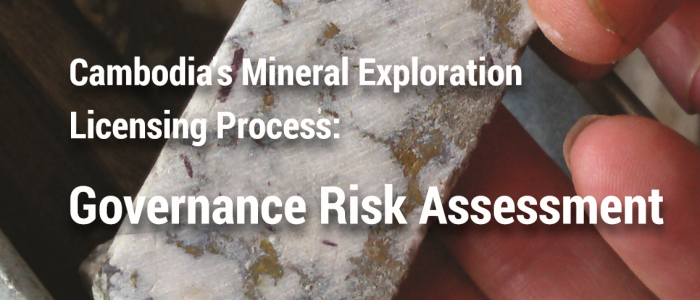Governance of Cambodia’s Mining Industry
EMC report, Cambodia’s Mineral Exploration Licensing Process: Governance Risk Assessment aims to identify and analyse governance risks associated with the process for granting mineral exploration license in Cambodia. The study is in line with the Ministry of Mines and Energy (MME) efforts to improve the governance system in mining sector and their recently adopted initiative to enhance effectiveness of the Ministerial Exploration Process.
This assessment was conducted by Emerging Markets Consulting (EMC) with support from Transparency International Cambodia (TI-Cambodia), using the TI Corruption Risk Assessment (MACRA) tool. This research is primarily based on semi-structured interviews with 21 representatives from key stakeholders from government ministries, local authorities, civil society organizations, mining industry association, and mining companies. This assessment also went through 3 rounds of consultation and validation with stakeholders from the mining sector in Cambodia. The risks and recommendations were presented to key stakeholders in the validation workshop on 9th June 2017 and accepted by MME.
Good Governance in Extractive Industries
Mineral endowments have been a developmental blessing for many countries the world over. However, an estimated 680 million people in resource-rich countries still live on less than USD 2 per day. For them, their countries wealth has failed to deliver what it promoted: sustainable economic and social development that benefits the many not only a few. Effective governance and corruption control systems in mining are critical to enhancing the contribution of mining to sustainable human development by increasing transparency, accountability and effective regulation of the mining sector.
Good Governance in Cambodian Extractive Industries
In Cambodia, mining is still in its infancy and the contribution to the National Gross Domestic Product (GDP) is relatively small while petroleum and mining products are accounted for only 0.1% of Cambodia exports in 2016. Having said that the mining industry has significant potential to grow. The study on geology indicated that Cambodia has great mineral potential such as gold, iron, bauxite, manganese, silica sand, kaolin, limestone, phosphate, sapphires, rubies, coal, construction material, and other minerals.
The risk assessment identified that the new MME process for granting mineral exploration license eliminated 14 pre-existing risks from the previous process. However, 14 governance risks remain covering 1 contextual (CF) risk, 8 process-design (PD) risks, 3 process-practice (PP) risks, and 2 response-accountability (RA) risks. These risks relate to the understanding of surface rights, sharing of information, timeline of process, application evaluation process, public consultation, beneficial ownership, and approval from other line ministries.
The risks identified are primarily process related. This reflects the early stage of the MME’s implementation of the reform agenda and provides a great opportunity for stakeholders to contribute to the governance of mineral exploration license process. The formation of the Extractive Industry Governance Forum (EIGF) provides an excellent working platform to progress this development, which will require support and commitment from all relevant stakeholders.
To mitigate these risks, this research recommends the development of a more robust regulatory framework with support for more stringent enforcement of the intent of Sub-Decree No.72. The research also recommends the setting- up of standard operating procedure (SOP) or guideline for application evaluation, public consultation, and improved access to public information through formal websites (MME and EIGF).

Comments are closed.